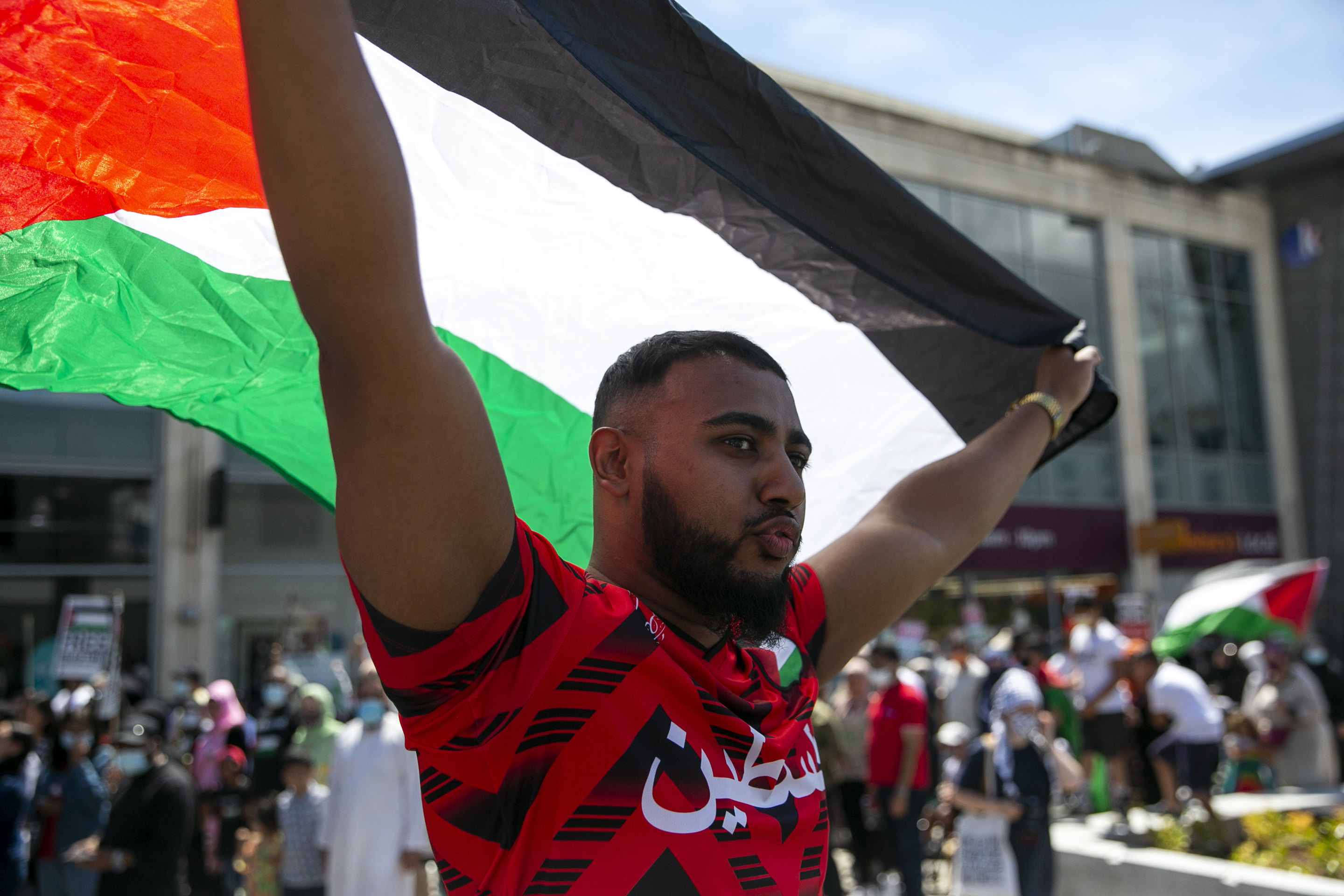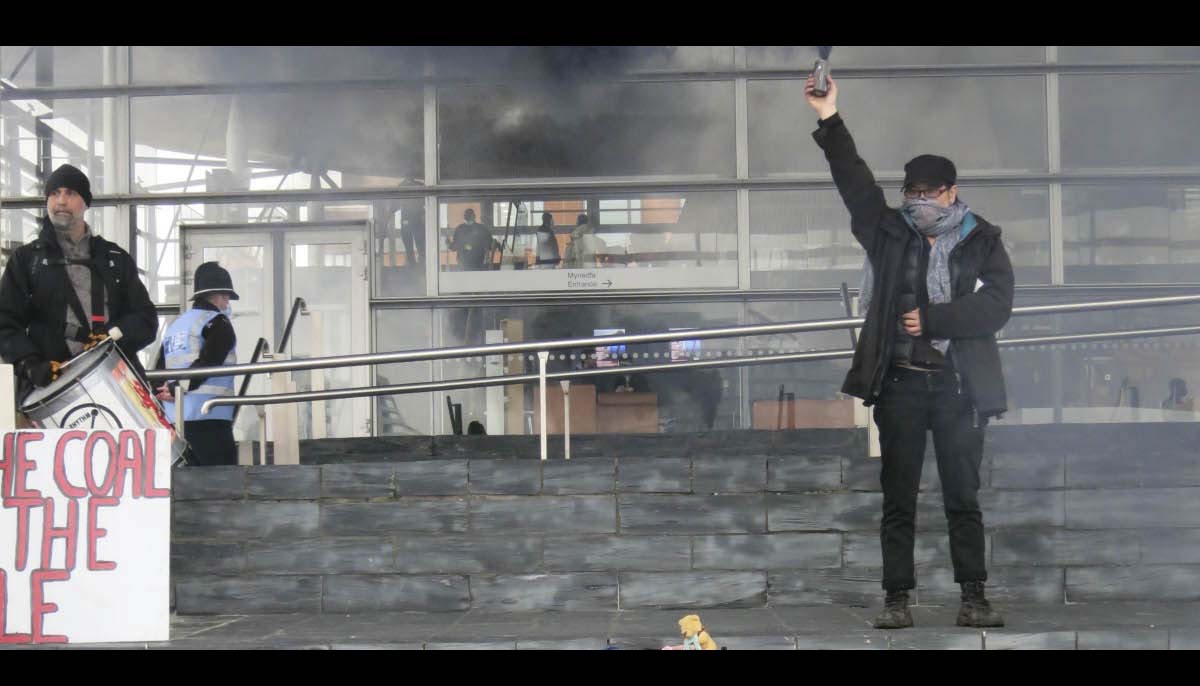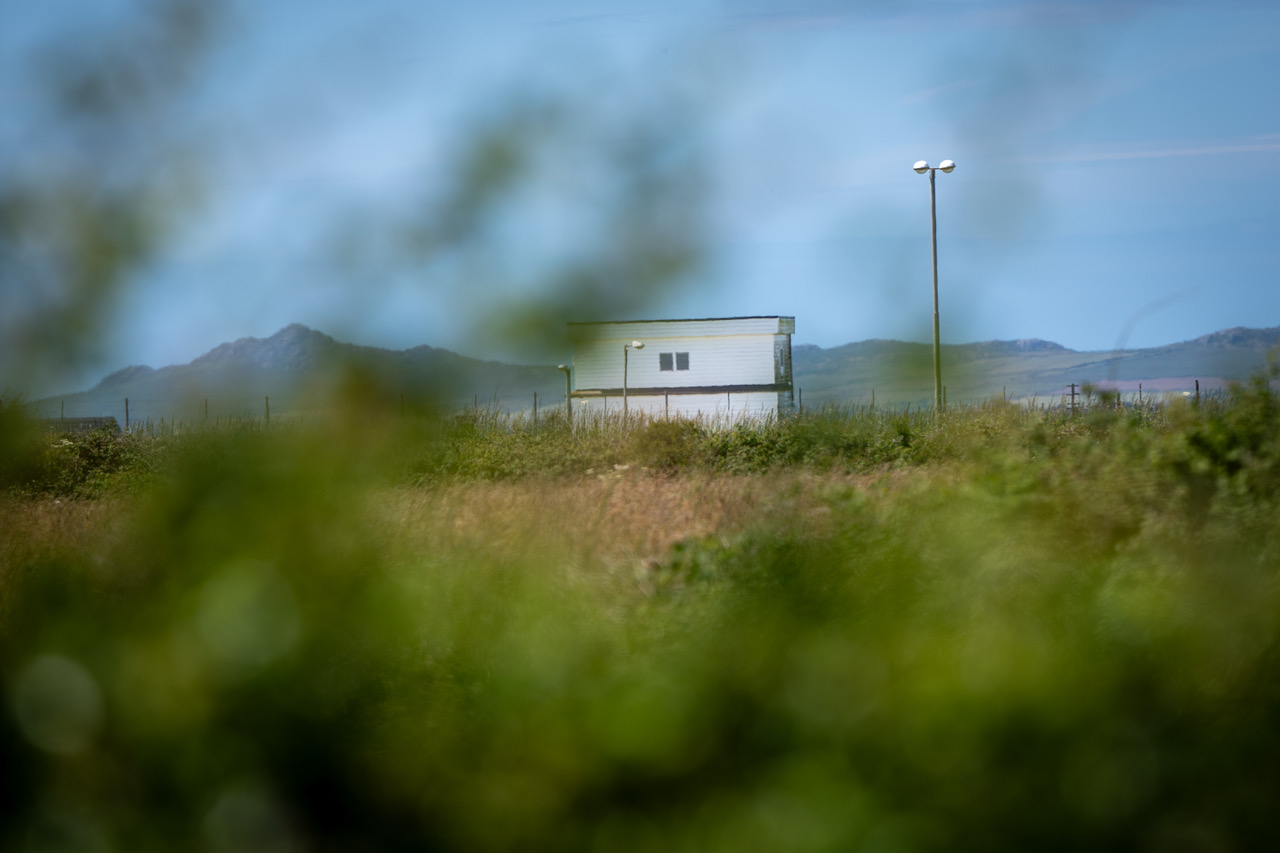
“Muslim Lives Don’t Matter” – Palestinians On The Double Standards Of Ukraine Coverage
Since the Russian invasion of Ukraine, Palestinians have witnessed a world turned upside down. On one hand, they have seen a situation they recognise all too well – a major military power bombing a neighbouring population only to be met with fierce resistance. “We’ve been there, we’ve been in their shoes,” as one Palestinian puts it.
But on the other hand, they’ve witnessed swift condemnation of Russia by the same media, political and cultural establishment which for years has tried to outlaw any criticism of Palestine’s occupier and aggressor, Israel. It’s clear, says one campaigner, “Muslim lives don’t matter.”
Here, Palestinians in Wales and their supporters discuss what the contrasting reactions show.
By SC Cook. Image, pro-Palestine protest in Wales 2021, by Tom Davies
Faisal is a Welsh Palestinian and Chemical Engineer in Swansea, and has been looking at the horrific events in Ukraine over the past two weeks with mixture of emotions.
“As Palestinians, we don’t just sympathise with the cause of the Ukrainian people, we empathise with it,” he tells me. “We’ve been there, we’ve been in their shoes. We completely feel what they’re going through. How families are now being torn apart, how they’re being forcibly displaced, how there is now a refugee crisis at hand. These are all things which Palestinians have suffered.”
He says it wouldn’t be Palestinian to not support the Ukrainian people “fighting for their rights, freedom, territorial integrity and sovereignty.”
“That’s what it means to be Palestinian,” he says. “Therefore, the way I react to this situation is I fully support the Ukrainian people specifically against this Russian invasion of their land.”
“Bigotry on a fundamental level”
But there has been something about how the invasion has been received by the media and political class in the West which has left a bitter taste in the mouth.
As the media cheers on ordinary Ukrainians constructing makeshift barricades, or homemade explosives against the occupying Russian army, it’s been impossible not to contrast it to the vilification of Palestinians who do the same thing against Israel.
“There is definitely bigotry,” says Faisal “occurring on a fundamental level when it comes to the Western media.”
Nizar is a humanitarian activist from Swansea who has been involved in Palestine solidarity campaigning work for over a decade.
“I fully stand with them [Ukrainians] in this injustice that is taking place,” he says. “My outrage and my disappointment is with global powers in the world.”
“The same activities and the same things that are taking place in Ukraine now, and people are being hailed as freedom fighters and patriots, [but] when Palestinians do it, they’re called terrorists and extremists.”
He cites various news reports where presenters have insinuated or simply said directly that the bombing of Ukraine is especially shocking because it is in Europe and not the Middle-East.
“They specifically say that we can resonate with these people because they’re white, and they’re Christians,” says Nizar.
“I think this just puts the icing on the cake to what many people have been saying for a long time, which is Muslim lives don’t matter.”
Faisal describes seeing news broadcasts where the implication is that, “the people in places that have been invaded in the past, whether it be Palestine, Syria, Iraq or Lebanon are nothing more than barbarians.”
“If a Palestinian was to fight for Palestine, they are branded terrorists.”
Another aspect about the media and political response that has been especially marked, is the contrasting attitudes to boycotts or displays of solidarity.
“As Palestinians,” says Faisal, “we have every right to ask why the likes of Boris Johnson, Joe Biden, and all these Western countries.. why are they all imposing these crippling sanctions on Moscow if they will not uphold the same sort of actions against Israeli colonialism?”
Nizar agrees. “People are furious, and rightly so,” he says of the situation facing Ukrainians.
“But when the Manchester City footballer came out with a Palestinian flag, or the Celtic football supporters came out with a Palestinian flag, they were fined, the club was fined.”
One notable example is that of the Arsenal footballer Mohamed Elneny, who expressed public support for Palestine in May 2021. The club quickly reprimanded him, in public. By contrast, Arsenal’s official social media feed over the weekend was adorned with a Ukrainian flag.
“People said that football and politics shouldn’t mix,” says Nizar. “But now you’ve got football teams refusing to play against Russia because of what they’re doing. Whereas the BDS [Boycott Divestment & Sanctions against Israel] movement is labelled as anti-semitic.”
For Palestinians and their supporters, this has also played out in the wildly varying attitudes to those who want to fight against Russia when compared to those who want to fight against Israel.
When the British Foreign Secretary Liz Truss said that she would support people from Britain who wanted to go to Ukraine to fight Russia, it hit a nerve.
“I can only imagine what the difference in tone would be for those who want to fight for Palestine, or for the Syrians, or for the Lebanese, or the Iraqis,” Faisal says. “The only difference is really the skin colour.”
Faisal and others have had to look on in disbelief as have-a-go soldiers from Britain heading to Ukraine are celebrated by the press on a daily basis, or when BBC radio gives hours of air-time to the construction and use of a molotov cocktail in Guerilla warfare.
All the while, they see the way in which their resistance is condemned in the strongest possible terms across the political spectrum, even when it has nowhere near the resources or international backing of the Ukrainian army.
“People in Palestine are also fighting for their rights, also fighting for their land, their freedoms and their sovereignty,” Faisal says. “They’re just fighting for the basic right to live. And yet, you know, if a Palestinian was to fight for Palestine they are then branded terrorists.”
It’s another example of the double standards that exist in the West, he points out.
“It’s almost as if Europeans and perhaps, you know, the white population, is allowed to defend themselves and defend their freedoms, but a non-European or non-white person, when they were to do the exact same thing, they’re branded as something completely different”
“The Welsh Government only cares and supports those that favour their political and economic gain.”
Abdel is in his twenties and works as a researcher in a university in south Wales. He describes himself as ethnically Palestinian but born in Wales. Due to fears about the impact that speaking out could have on his career, he asked that we change his name.
“The invasion of Ukraine by Russia is nothing short of barbaric, selfish and outright greedy,” he tells me at the start of our discussion, adding that it is an “insight into what Palestinians have been suffering for many decades.”
“What is unfolding in Ukraine and how it is showcased in the media is an example of how the West can selectively favour and choose whose liberation movement they condone.”
“War crimes are being committed on Palestinians on a daily basis,” Abdel continues. “Isreal are bombing and invading Palestine at every opportunity they get. Hospital, homes and schools are being bombed and attacked and nothing gets reported in the media to acknowledge the suffering of Palestine.”
He describes how the media “consistently fails to report how Israel revokes the basic privileges of human life such as water, the right to live in their own home and medicines.”
“But this is discarded and ignored! And for what? Because of the colour of the Palestinian flag? Their language? Or the fact that the West benefits more from Israel than they would from Palestine?”
As the dynamic that Abdel and others described plays out across the West as a whole, Wales has been no exception.
Last year, when Israel ramped up a programme of ethnic cleansing in the historic Palestinian neighbouhood of Sheikh Jerrah, which prompted Palestinian resistance and preceded the bombing of Gaza by Israel, which killed 260 palestinians, including 66 children, official politics in Wales was eerily silent.
It took over four days for First Minister Mark Drakeford to say anything about the crisis, and when he did, it came indirectly via a joint statement with the Interfaith Council for Wales and did not even mention Palestine, let alone criticise Israel. It simply referred to troubling “‘events in the Middle East.”
By contrast, Drakeford’s pledge of support for Ukraine was strong and immediate. On the day Russia invaded the country, he tweeted: “The news coming out of Ukraine overnight is horrifying and appalling.
The international community must now stand together with the people of Ukraine against such unprovoked aggression. #Stand With Ukraine.”
Later that day he spoke to Times Radio, saying that the West needed to ensure “that the current Russian government feels the consequences of the actions it has chosen to take.”
Since then, the Welsh Government has added a Ukrainian flag to its Twitter bio, the First Minister has made public statements about the crisis most days, including backing the Welsh FA’s boycott of the Russian national team, announcing a trip to Brussels to discuss the situation and pledging support for Ukrainian refugees.
Likewise, when Adam Price suggested stopping a ship carrying Russian oil from docking in Wales, Mark Drakeford fully agreed. Even though it turned into nothing more than a gesture, it was clearly intended to send out a clear message against the Russian invasion.
This can be contrasted this with the way in which companies that are involved in the ongoing dispossession of Palestinian land are either given a free pass, or actively supported by the Welsh Government.
As Palestine Solidarity Cymru point out, JCB have a factory in Wrexham which is designated an ‘anchor company’ by the Welsh Government, even though JCB equipment is used to demolish Palestinian homes and villages, and to construct illegal Israeli settlements. The group also says that Israeli-owned Elbit Systems tests its combat drones at Parc Aberporth, West Wales, which are later used against Palestinians, and the firm has received financial support from the Welsh Government.
None of the people I spoke to begrudge the actions taken by Welsh Government or local authorities in support of Ukraine, and are aware they may face criticism for even pointing out the difference in responses, but it has been so marked they have been left with little choice.
Equally, the charge of hypocrisy is not levelled at ordinary people in Wales, who marched in their thousands last year for Palestine, but at the political establishment here and beyond.
“Selective outrage by a government whose nation [Wales] is so diverse and filled with Palestinians, very clearly suggests the agenda to ignore Palestine is simply because Mark Drakeford does not value all of humanity equally,” says Abdel.
“The lack of respect and support for all humans is well and truly clear by the Welsh Government,” he continues. “They only care and support those that favour their political and economic gain.”
Faisal is in broad agreement with this last point. “The West’s interests are part of the reason as to why media coverage is really poor, when it comes to the Middle East and what happens there, when [compared] with an identical situation to the Ukrainian crisis,” he says.
“Israel won’t be brought to account because it’s not in the interests of Western powers…it [Israel] is their centre of control over the Middle East.”
The contrast is a huge one. Whilst the Palestinian resistance is starved by Israel and the West of arms, the Ukriainian army is now the recipient of the biggest flow of arms in Europe since the second world war, according to the Financial Times.
“This should encourage pro-Palestinian campaigners.”
The situation could, however, make it easier to argue in favour of the Palestinian resistance more widelly, and push back against its negative portrayal in the media and official politics.
“I fully respect people like the Klitschko brothers and the people of Ukraine saying that we will fight, because that’s every person’s right,” says Nizar.
“And I think this should encourage pro-Palestinian campaigners, and Palestinian people even more to continue their fight because it shows that the world believes that if you are oppressed or if you’re occupied or invaded, that you have every right to defend yourself.”
“And I think this should be a bit of a nudge for us to fight harder, because clearly the world supports it.”
Faisal: “That’s another example of the double standards that we see in the West. Where, you know, it’s almost as if Europeans and perhaps, you know, white population is, is allowed to defend themselves and defend their freedoms, but, you know, whereas a, you know, a non European or non white person when they were to do the exact same thing, and they’re branded as something completely different”


